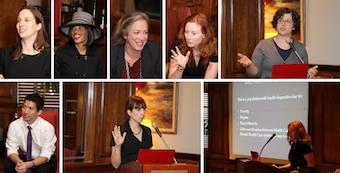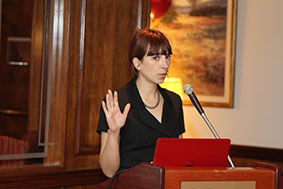Addressing Critical Health Needs In LA
Researchers and community advisers meet to discuss progress at SC CTSI meeting.
Whether you are producing movies that change women's attitudes toward cervical cancer screening, or using mobile technology to keep people with diabetes out of the emergency room, public health research is complex and painstaking work. In many cases, however, the hard part is not the science but finding the right partners and participants.
Five USC-led research teams, whose projects received key support from the Southern California Clinical and Translational Science Institute (SC CTSI) Community Engagement team, presented their studies and findings recently at the SC CTSI Community Engagement Dinner meeting.
The SC CTSI, whose mission is to speed the conversion of research into public health solutions, provides expertise and assistance that not only helps investigators at USC and CHLA conduct their research but also benefits the university's neighbors throughout Los Angeles and Southern California.

Storytelling that saves lives
Cultural differences in cervical cancer rates are central to the research of Lourdes Baezconde-Garbanati, PhD, MPH, associate professor in Preventative Medicine and Sociology at Keck School of Medicine of USC. Although cervical cancer is largely preventable and treatable through regular screening, groups including Hispanic and Korean women do not get adequately screened and thus develop the disease at disproportionately high rates.
Community groups and health care professionals have been instrumental in helping us understand when issues in our studies need cultural clarification.
To find the best way to teach these communities about the importance of regular screening, Baezconde-Garbanati and her colleague Sheila Murphy, PhD, associate professor in the Annenberg School for Communication, compared two short films containing the same information – one in a newsy style featuring white-coated doctors stating facts, the other in a narrative style, as a story with actors portraying a family conversation. The film was a collaboration with the USC School of Cinematic Arts, in particular Doe Mayer and Jeremy Kagan at the Change Making Media Lab.
They found that women who watched the conversation film retained more information and were more likely to get screened, a finding that could have substantial impact on many communities. Watch the video clip now.
Lourdes Baezconde-Garbanati, PhD, MPH, USC associate professor in Preventative Medicine and Sociology. View photo gallery
SC CTSI's assistance on the project included funding that enabled researchers to produce a Spanish-language version of their cancer information films, said Baezconde-Garbanati. Because community groups and health care professionals were engaged from the start of the research process, they were more than a source of research participants. "They've been instrumental in helping us understand when issues in our studies need cultural clarification," she added.
Helping people with mental illness get lifesaving medical care
People with severe mental illness are often medically marginalized, suffering far more physical health problems than average, with life expectancies 20 to 25 years shorter, said Laura Pancake, LCSW, corporate director of wellness and recovery services at Pacific Clinics, a regional provider of mental health services.
"There's a stigma toward people with serious mental illness" that leads to problems like incorrect diagnoses and poor follow-up, said Pancake.
Typically, researchers go into the community, collect data and then present their findings to other academics at conferences and in journals, and rarely do the people in the community have the opportunity to find out or implement the results. We want community agencies and clinicians to help shape the research and then be able to apply it.
To help people with mental illnesses get appropriate care, the USC-Pacific Clinics project focused on integrating mental and physical health care – traditionally very separate worlds. USC School of Social Work investigators, led by John Brekke, PhD, partnered with Pacific Clinics to test interventions using healthcare navigators, people who assist mental health clients by teaching them how to access and manage their own healthcare services effectively. View the presentation
Laura Pancake, LCSW, corporate director of wellness and recovery services at Pacific Clinics. View the photo gallery
Holly Kiger, one of SC CTSI's research navigators, worked with researchers on this project, and her involvement is typical of the SC CTSI's role in community-engaged research. As a member of the USC research team, she assists with the training of the healthcare navigators herself. She also helped apply for additional funding to support the program, and continues to play a central role in disseminating information about it.
"Typically, researchers go into the community, collect data and then present their findings to other academics at conferences and in journals, and rarely do the people in the community have the opportunity to find out or implement the results," said Kiger. "We want community agencies and clinicians to help shape the research and then be able to apply it."
By engaging the community earlier and more closely in the process, we not only help researchers accelerate their projects, we can deliver health care and education that makes a difference to our neighbors.
Text-message reminders to help people with diabetes manage their health
Type 2 diabetes plagues the Latino population in Southern California, said Elizabeth Burner, MD, MPH, a research fellow at the Department of Emergency Medicine at the Los Angeles County+USC Medical Center. But due to language, culture, and other barriers, these patients may not manage their disease optimally.
Burner tested the use of a program that used mobile phones to text educational and motivational messages to diabetes patients to improve their understanding of the disease and encourage meaningful lifestyle changes. During the study, researchers texted reminders about nutrition, medications, and exercise, prompting some participants to adopt healthier behaviors. Because mobile phones are nearly ubiquitous in America, "mHealth" could be a powerful public health approach. View the presentation
"The SC CTSI provided funding and a way for us to look at this kind of technology and develop a way to get more deeply into the community and turn our idea into something real," said Burner.
Elizabeth Burner, MD, MPH, research fellow in the Department of Emergency Medicine at the Los Angeles County+USC Medical Center. View the photo gallery
Mobile phone-based games that teach city kids about gardening and healthy foods
Another SC CTSI-aided study is battling childhood obesity with mobile technology-based games. The "Virtual Sprouts" project teaches LA-area 3rd-5th graders and their families about gardening, fruits and vegetables, nutrition, and cooking, said Marientina Gotsis, MFA, research assistant professor in the USC School of Cinematic Arts.
To have an umbrella organization like the SC CTSI bridge the different groups involved makes a very big difference.
Many kids who live in urban neighborhoods simply aren't exposed to gardens and the variety of food they produce, said Gotsis. While the games focused on gardening, objectives such as recipe-following also taught kids about math and science.
"To have an umbrella organization like the SC CTSI bridge the different groups involved makes a very big difference," said Gotsis.

Marientina Gotsis, MFA, research assistant professor in the USC School of Cinematic Arts. View the photo gallery
The plight of transgender people seeking basic medical care
Men and women who have gone through gender reassignment have all the typical medical needs, as well as some that are specific to transgender people. Yet most physicians are uncertain about treatment options for transgender people, and some are even wary of treating transgender patients, said Maddie Deutsch, MD, director of the Transgender Health Care at the Los Angeles Gay & Lesbian Center.
"Fifty percent of transgender people report having to teach their provider about their own care, and eleven percent report they've been refused care," said Deutsch. "There's a huge gap in training and research."
SC CTSI has been critical in helping us continue our research.
To close that gap, Deutsch is collecting cardiovascular and metabolic data following cross-sex hormone therapy, as well as data on attitudes and other issues. View the presentation
Deutsch said SC CTSI provided key funding and access to the Institutional Review Board (IRB). In addition, SC CTSI’s community engagement specialists connected her to the Community Clinic Association of Los Angeles County, and biostatistics expert consultants helped analyze her data – steps essential to the research process. "The SC CTSI has been critical in helping us continue our research," she said.
Maddie Deutsch, MD, director of the Transgender Health Care at the Los Angeles Gay & Lesbian Center. View the photo gallery
“Together we can bridge what had been a gap”
Such two-way benefits are a core element of SC CTSI's objectives. "By engaging the community earlier and more closely in the process, we not only help researchers accelerate their projects, we can deliver health care and education that makes a difference to our neighbors," said Katrina Kubicek, MA, assistant director of SC CTSI Community Engagement.
"Together we can bridge the community-university gap," said Glovioell Rowland, PhD, MPH, a community adviser for SC CTSI. "Staying connected builds research capacity in the community and promotes translational science for researchers at the university."
Glovioell Rowland, PhD, MPH, community adviser for SC CTSI. View the photo gallery
The SC CTSI Community Engagement efforts serve as a sort of research matchmaker: the team approaches community groups, clinicians, and health care providers to discover their most pressing public health needs. Then they identify the right USC researchers and help the investigators shape projects, find funding, carry out the research, and ultimately implement the results in real-world solutions.
SC CTSI is a member of the Clinical and Translational Science Awards (CTSA) network funded through the National Center for Advancing Translational Sciences (NCATS) at the NIH (Grant Number UL1TR000130). Under the mandate of “Translating Science into Solutions for Better Health,” SC CTSI provides a wide range of services, funding, and education for researchers and promotes online collaboration tools such as USC Profiles.



